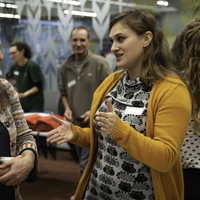
PhD
Senior Lecturer
- About
-
- Email Address
- davina.derous@abdn.ac.uk
- Office Address
- School/Department
- School of Biological Sciences
Biography
March 2025 - present Senior Lecturer (Associate Professor), University of Aberdeen, Aberdeen, UK
September 2022-February 2025 Senior Research Fellow, University of Aberdeen, Aberdeen, UK
September 2019-August 2022 Independent Research Fellow, University of Aberdeen, Aberdeen, UK
July 2017-August 2019 Post-Doc Research Fellow, University of Aberdeen, Aberdeen, UK
March 2017-June 2017 Research Assistant, University of Aberdeen, Aberdeen, UK
2013-2017 PhD Biological Sciences, University of Aberdeen, Aberdeen, UK
2011-2013 MSc Nutrition and Health, Wageningen University and Research Centre, Wageningen, the Netherlands
2008-2011 BSc Nutrition and Dietetics, Vives - University of Applied Sciences, Bruges, Belgium
Memberships and Affiliations
- Internal Memberships
-
School level:
2019-2023 Co-chair Athena SWAN committee
2019-2023 Co-chair Equality and Diversity committeeUniversity level:
2019-2023 Equality and Diversity Forum - External Memberships
-
Membership:
Member of the Society for Experimental Biology
Member of the Royal Society of Biology
Fellow of the Royal Statistical SocietyEditorial and peer review activities:
Review editor for Frontiers in Physiology (integrative physiology) (2020-present)
Peer-reviewed for several journals (verified by publons profile)
- Research
-
Research Overview
Welcome to the Derous lab! We focus on how environmental stressors impact the metabolism of species and in turn can lead to physiological changes. We take a system-wide approach and analyse changes across different biological scales by:
- Using high-throughput molecular assays to assess changes on a cellular level (e.g., genes, proteins, metabolites) across different organs of species and use network biology approaches to gain further insights into the complex regulation of molecules.
- Measuring changes on a physiological level with a variety of different methods (e.g., hormones, sugar levels)
- Assessing whether this is reflected on a whole-body level of an organism (e.g., behaviour, reproductive output).
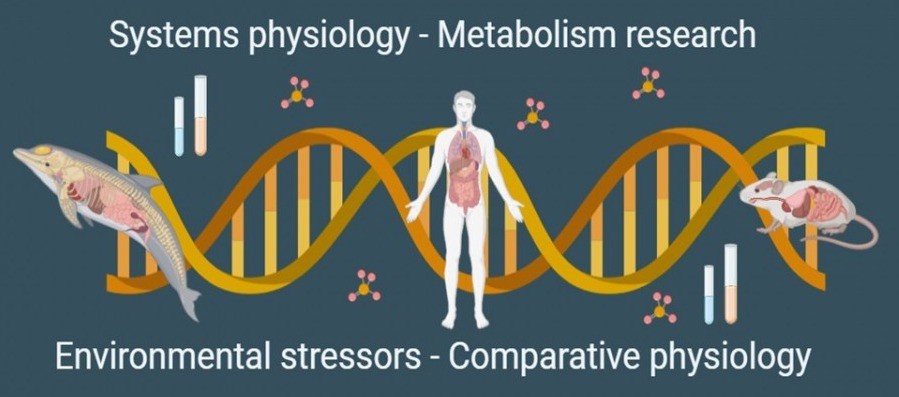
Research Areas
Accepting PhDs
I am currently accepting PhDs in Biological and Environmental Sciences, Nutrition and Health.
Please get in touch if you would like to discuss your research ideas further.

Research Specialisms
- Physiology
- Animal Health
- Metabolic Biochemistry
- Biological Sciences
- Endocrinology
Our research specialisms are based on the Higher Education Classification of Subjects (HECoS) which is HESA open data, published under the Creative Commons Attribution 4.0 International licence.
Current Research
Impact of diet type and nutrient availability on reproduction and physiological trade-offs
The optimal allocation of energy resources to maintain fitness levels depends on nutrient availability. When food is limited, an animal may conserve their energy reserves to increase their current survival until more food can be found. A way to do this is to trade-off between survival, reproduction and other physiological processes. Many species have shown that when food is limited, their reproduction rate reduces. The exact mechanisms regulating these processes are still not entirely clear. As such, a large part of the lab's research is focused on understanding fundamental biological mechanisms behind these physiological trade-offs and the fasting response. In addition, we also focus on understanding the biological basis of healthy ageing and metabolic resilience, contributing to a healthier and more resilient population in a changing climate.
Examples of research output:
- Graded calorie restriction series led by Prof John Speakman and Dr Sharon Mitchell of the Energetics Research Group
- Unique fasting response in bottlenose dolphins in collaboration with Dr Dorian Houser and Prof David Lusseau: Houser et al. (2021)
- Pregnancy rates in minke whales in collaboration with PhD student Devonne Gardiner (Leverhulme funded) and Dr Joanna Kershaw: Gardiner et al. (2025)
- Trade-offs in overcrowded fruit flies in collaboration with Dr Juliano Morimoto: Morimoto et al. (2023)
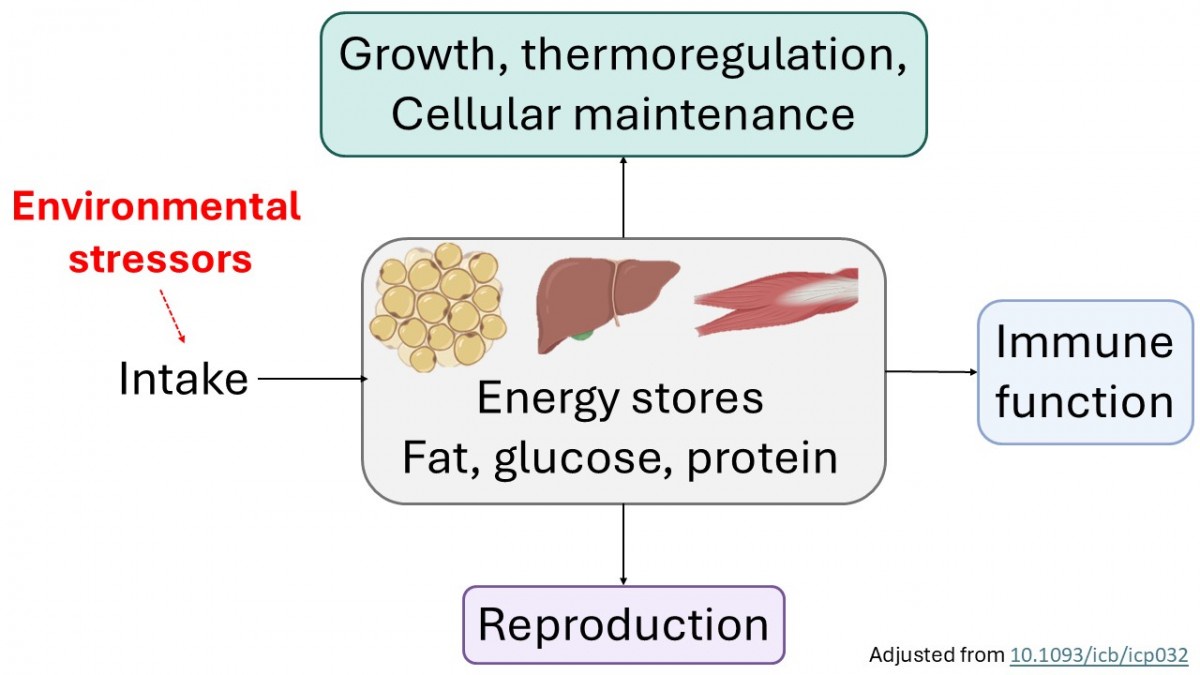
Evolutionary adaptations in key metabolic processes
Metabolism is central to the day-to-day functioning of a species and certain animals have evolved specific mechanisms to deal with extreme/harsh environments. Evolution is a dynamic process that happened over many generations and understanding those key changes on a molecular level allows us to ask important questions of how animals may respond to stressors and what it may mean for their conservation. For example, nutrient shortage caused by anthropogenic stressors may have a more detrimental impact on one species than on another.
Examples of research output:
- Comparing genomes of several dolphin/whales species to outgroups with a focus on genes related to nutrient signalling in collaboration with Dr Marius Wenzel: Derous et al. (2021)
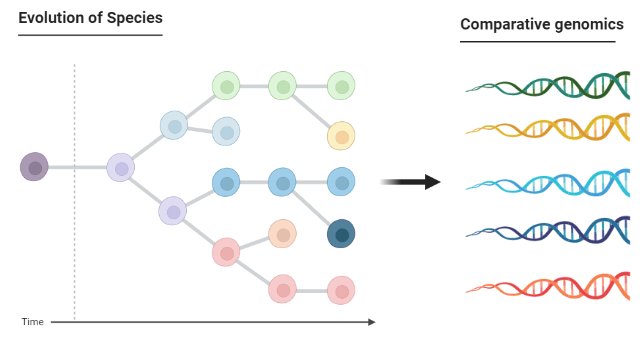
Finding novel health markers in marine mammals
Porpoises, dolphins, and whales (i.e., cetaceans) are exposed to many challenges in their environment. These challenges, referred to as environmental stressors, are often caused by humans and are emerging as conservation threats for many cetacean species. The health and nutritional state of cetaceans is assessed through how much fat they have in their blubber (fat layer under the skin). However, cetaceans have evolved to have thickened blubber and the stored fat in the blubber is not only used as an energy source but also plays a key role in thermoregulation and buoyancy control. We, therefore, need to understand how environmental stressors influence blubber biology and particularly how blubber signals energy availability to other organs. We can then create novel health markers to assess cetacean health.
Examples of research output:
- Review on the impacts of climate change in collaboration with Dr Filipa Samarra and PhD student Anna Kebke: Kebke et al. (2022)
- Review on biomarkers for health in cetaceans in collaboration with Dr Andrew Brownlow and the Scottish Marine Animal Stranding Scheme: Derous et al. (2020)
- Proteomics profiling in free-ranging baleen whales for biomarker discovery in collaboration with Dr Joanna Kershaw: Kershaw et al. (2024)
- Protein degradation in bottlenose dolphins when in poorer health in collaboration with Prof Patricia Fair and Prof David Lusseau: Derous et al. (2022)

Using non-model organisms to combat human diseases
Uncovering the biological mechanisms behind human diseases (e.g., diabetes, obesity, cardiovascular diseases) and then identify a “molecular fingerprint” associated with those diseases is the first step towards translational medicine. Despite the recent advances in human diseases, we still struggle to find effective ways to treat them. Some non-model species have remarkable capacities to deal with for examples wounds or large amounts of fat. By using comparative physiology, we can identify unique processes in non-model species that can help us develop treatments for human diseases.
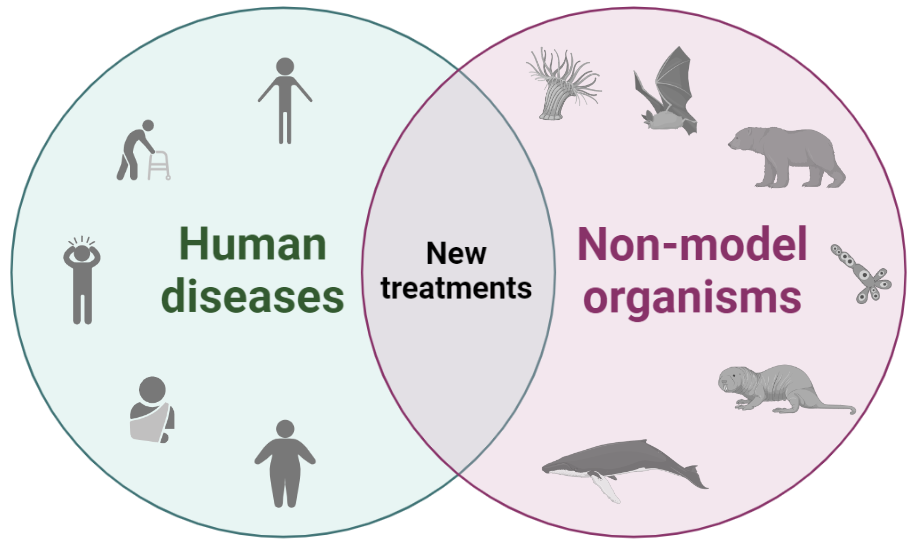
Supervision
My current supervision areas are: Biological and Environmental Sciences, Nutrition and Health.
Current
- PhD. Alexandra Tranganida (October 2022 - present): Using molecular approaches to uncover how blubber is regulated under different physiological challenges in stranded cetaceans. Leverhulme funded
- PhD. Devonne Gardiner (October 2022 - present): Using molecular approaches to investigate the control of feeding-fasting cycle of baleen whales. Leverhulme funded
Previous
- PhD. Francesca Gray (April 2022 - July 2024): Flying sentinels: using a long-distance migratory bird to assess exposure to POPs over two continents and their health consequences. QUADRAT funded
- M.Sc (research). Stephen Lane (Sept 2021 - November 2022): Molecular mechanisms underlying parasite-induced lifespan extension in a social wasp.
- M.Sc (research). Daniel Phillips (Nov 2020 - June 2021):The effects of graded levels of calorie restriction : Transcriptomic response and alternative splicing in the C57BL/6 mouse.
- M.Sc (research). Stephanie Summers (Sept 2018 - April 2019): The Impact of Short-Term Graded Calorie Restriction on Melanocortin-3 receptor (MC3R) Knockout Mice.
Funding and Grants
- Royal Society of Edinburgh: Small research grant - PI (£5k Sept 2025-Aug 2026): "Metabolic dysfunction of fatty liver in harbour porpoises: a step towards measuring resilience of a key species in our changing ocean"
- University of Aberdeen Grand Academy: Bid development - Co-I (£9,9k Apr 2023 - Sept 2023): "Valuable in death? Assessing molecular changes through blubber tissue decomposition in marine mammals with implications for use of stranded animals in research"
- Leverhulme Trust grant - PI (£215k, Sept 2022-Sept 2026): "Characterising the impact of environmental stressors on cetacean metabolism"
- University of Aberdeen Grand Academy: Internal Pump-Prime funding for interdisciplinary research - PI (£10.6k, Nov 2021-Oct 2022): "Using the rapid regenerative response of the beadlet anemone (Actinia equina) as model system for human wound healing"
- University of Aberdeen Grand Academy: Internal Pump-Prime funding for interdisciplinary research - PI (£9.8k, June 2021-Dec 2021): "A holistic approach towards identifying the phenotypic plasticity and resilience response to environmental stress in the intertidal zone"
- Marine Alliance Science Technology Scotland “Emerging from Lockdown” Award - PI (£4.6k, May 2021-Dec 2021): "Proteomic approach to characterise the functional differences between blubber layers in harbour porpoises"
- NERC Environmental Omics Facility (NEOF) Early Career Researcher pilot grant - PI (£8.9k, May 2021-Dec 2021): "Towards identifying the epigenomic basis of resilience to environmental stress"
- The Icelandic Research Fund Project grant - Co-I (£306k, Sept 2021-Aug 2024): “The role of ecosystem stability for the ecological specialisation of marine top predators”
- ACU Early Career Conference Grant to attend the 6th International Marine Conservation Congress (June 2020)
- University of Aberdeen Grant Academy: core facility vouchers - PI (£2.6k, Feb 2020-Jul 2020): "Linking the energy status of stranded cetaceans to their cause of death"
- Centre for Genome Enabled Biology and Medicine PhD studentship (£66.5k, Sept 2013 - Feb 2017): "Multi-tissue transcriptomic analysis of graded calorie restriction in the mouse"
- Teaching
-
Teaching Responsibilities
- BI1512 Diversity of Life 2 (2023-present, course coordinator)
- BI2510 Comparative Physiology 1 (2022-present)
- BI25Z5 Fundamentals of Marine Biology (2025-present)
- BI3512 Comparative Physiology 2 (2022-present, course coordinator)
- ZO4834 One Health: links between humans, environmental and animal health (2025-present)
- ZO4820 Marine Biodiversity (2021-2023)
- Supervision UGT/PGT/PGR/PhD student projects
- Publications
-
Page 1 of 4 Results 1 to 10 of 37
Effects of graded calorie restriction: XXII. Impact of long-term graded calorie restriction on tissue partitioning, digestive efficiency, bone health, and coordination in male C57BL/6J mice
The Journals of Gerontology. Series A, Biological Sciences and Medical Sciences, vol. 80, no. 11, glaf168Contributions to Journals: ArticlesSexual segregation and stable pregnancy rates in the Gulf of St Lawrence’s minke whales (Balaenoptera acutorostrata) amidst environmental changes
Marine Ecology Progress Series, vol. 758, pp. 143-159Contributions to Journals: ArticlesProteome profiling reveals opportunities to investigate biomarkers of oxidative stress and immune responses in blubber biopsies from free ranging baleen whales
Conservation Physiology, vol. 12, no. 1, coae059Contributions to Journals: ArticlesIs minimally-invasive sampling the future of persistent organic pollutant (POP) research in birds?: A meta-analysis on tissue comparisons
Chemosphere, vol. 362, 142591Contributions to Journals: ArticlesSuper food or Super toxic?: Turmeric and spirulina as culprits for the toxic effects of food dyes in Drosophila
Journal of Insect Physiology, vol. 153, 104600Contributions to Journals: ArticlesThe effects of graded levels of calorie restriction: XX. impact of long term graded calorie restriction on survival and body mass dynamics in male C57BL/6J mice
The Journals of Gerontology. Series A, Biological Sciences and Medical Sciences, vol. 78, no. 11, pp. 1953-1963Contributions to Journals: ArticlesThe effects of graded levels of calorie restriction: XIX. Impact of graded calorie restriction on protein expression in the liver
The Journals of Gerontology. Series A, Biological Sciences and Medical Sciences, vol. 78, no. 7, pp. 1125-1134Contributions to Journals: ArticlesThe transcriptomic signature of physiological trade-offs caused by larval overcrowding in Drosophila melanogaster
Insect Science, vol. 30, no. 2, pp. 539-554Contributions to Journals: Articles- [ONLINE] DOI: https://doi.org/10.1111/1744-7917.13113
- [ONLINE] View publication in Scopus
Fur removal promotes an earlier expression of involution-related genes in mammary gland of lactating mice
Journal of Comparative Physiology. B, Biochemical, Systemic, and Environmental Physiology, pp. 171-192Contributions to Journals: ArticlesClimate change and cetacean health: impacts and future directions
Philosophical Transactions of the Royal Society B: Biological Sciences, vol. 377, no. 1854, 20210249Contributions to Journals: Articles
